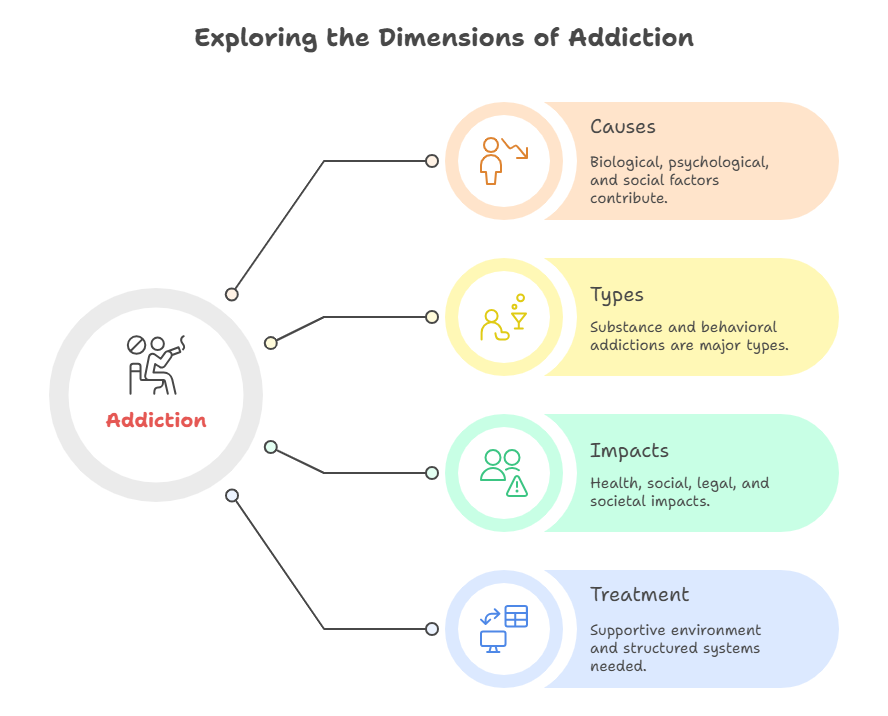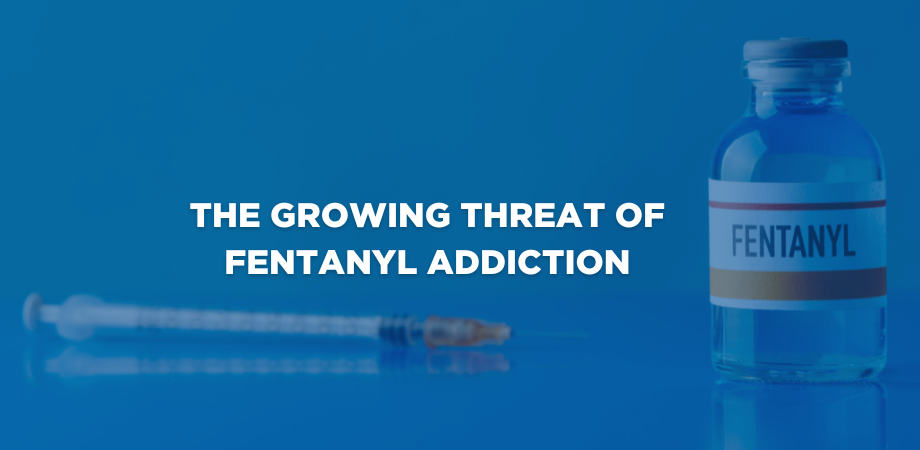Addiction is a complex psychological brain disorder that is often characterized by compulsive behavior to use substances or perform negative activities despite their harmful consequences. The chronic condition has affected the lives of millions of individuals around the world. In fact, there are over 300 million individuals who are locked in the clutches of substance abuse. Moreover, a large number of people in the world are addicted to gambling or other illicit activities.
Addiction is primarily caused by the interconnection of biological, psychological, and social factors. The two major types of addiction are substance addiction and behavioral addiction. The addictions impact the health and social presence of the individual. In some cases, it may result in legal problems and societal backlash.
Addiction treatment is a complex process and requires a supportive environment, complete with compassionate people and structured systems. A reliable rehab center can help individuals get away from the clutches of addiction and lead a fruitful life. Alpha Healing Center is a top rehabilitation center in India that has been a beacon of hope for these individuals for over 9 years. Our luxury rehab center takes pride in our treatment approach; we not only heal the body, but also the mind and soul. We have some of the best psychiatrists, doctors, counsellors, and staff to assist our clients in their recovery. If you or your loved ones are struggling with addiction, get in touch with us and start your path to recovery.
What is addiction?
Addiction is a chronic condition where an individual has a strong urge to take substances or perform an activity despite knowing its harm. It is a brain disorder, as it influences reward, motivation, memory, and related circuitry. These changes in the brain circuit last even after a person stops, which usually results in relapse.
Addiction develops after an individual is repeatedly exposed to a substance or rewarding behavior. The behavior influences the brain reward system, which provides intense pleasure and relief. Over time, it develops into a compulsive behavior, resulting in loss of control.

How Does Addiction Differ from a Habit or Dependence?
The key difference between addiction, habit, and dependence is the loss of control and compulsive dependence. More precisely,
- A habit is a learned behavior that is repeated regularly, but is a conscious decision. It doesn’t involve a compulsive behavior and doesn’t have negative consequences.
- In physical dependence, the body adapts to a substance or rewarding behavior. This leads to tolerance and withdrawal symptoms when the usage is reduced or stopped. It is a physical state, and not entirely an addiction. For example, a patient may be prescribed pain medication, and they become dependent but not addicted.
- Addiction is a compulsive behavior wherein an individual wants to consume the substance or perform the rewarding activity, regardless of its negative implications.
Why Do People Become Addicted?
Addiction is a complex condition and is caused by a single or multiple conditions. This include;
- Genetics: Biological factors, like genes, play a major role in addiction. In fact, as per research, 40%-60% of a person’s vulnerability to addiction stems from genetics. Variations in the genes influencing the brain reward function can play a pivotal role in addiction.
- Mental Health Problems: Individuals suffering from mental health problems have a high chance of resorting to addiction to numb their symptoms. Co-occurring mental health disorders, such as depression, anxiety, Bipolar Disorder, and ADHD, significantly increase risk.
- Social Conditions: An individual’s social conditions, including family structure, workload, or early life experiences, can put them on a path to addiction. If there is a lack of family support or poor social conditions, a person can resort to addiction.
Who Are the Most at Risk of Addiction?
Some groups have a high risk of developing addiction due to the combination of factors. The groups include:
- Teens and Young adults: Adolescence is an age of experimentation and risk. As per research, 29.7 million individuals in this category have substance abuse addiction. In fact, India has recorded over 1.5 crore adolescents who are addicted to substances. When it comes to behavioral addiction, 30.7% adolescents are addicted to mobile devices, and 21% suffer from food addiction, and other addictions.
- Individuals with Mental Health Issues: Individuals with mental health problems are highly vulnerable to addiction. Nearly 50% of individuals with mental health illnesses have some form of addiction.
- Genetic factors: Individuals with a close family member, such as a parent or sibling who is addicted, are at high risk of also being addicted.
- Ethnic Disparities and Socio-Economic Disadvantage: Individuals in low-income or poor sectors of society are at high risk of addiction.
What Are Different Types of Addictions?
Addictions are classified into two major groups: substance addiction and behavioral addiction. Let us learn more about them below.
1. Substance Addiction
Substance use disorder is the clinical term for the compulsive urge to use drugs or alcohol. The repeated use of these substances leads to the build-up of tolerance and dependence. When the substance is absent, it leads to painful withdrawal symptoms.
While alcohol and drug addiction dominate this section, there are some other forms of substances that fall under this category. These include:
- Opioid addiction includes painkillers like oxycodone and street drugs like heroin.
- Benzodiazepines addiction
- Synthetic stimulant addiction includes drugs like Mephedrone and Amphetamine.
- Barbiturates addiction
- Marijuana (Cannabinoid) addiction
- Inhalant addiction includes gases like nitrous oxide or paint that bring a high when the fumes are inhaled.
- Stimulant addiction includes drugs like Ritalin and Adderall alongside substances like meth or cocaine.
- Hallucinogen addiction includes drugs like MDMA, magic mushrooms, and LSD.
- Prescription drug addiction
- Nicotine addiction
2. Behavioral Addiction
Behavioral addiction follows compulsive behaviors but is a non-substance-related addiction. It follows the same dopamine reward system in the brain, which results in loss of control or preoccupation.
Examples of behavioral addiction are
- Gambling addiction
- Compulsive shopping addiction
- Gaming disorder
- Hypersexual disorder
- Food addiction
- Work addiction
What Are the Common Signs and Symptoms of Addiction?
The symptoms of addiction are seen across the physical, emotional, and behavioral domains. Common signs and symptoms include:
Physical Symptoms
- Increased tolerance to substances
- Experiencing physical and psychological distress when abstaining from the substance
- Weight loss or gain with frequent illness
- Neglected hygiene and grooming
Emotional Symptoms
- Inability to stop using and increased cravings
- Explosive anger and mood swings
- Anxiety, depression, or some other mental problems
- Feeling of guilt or shame
Behavioral Symptoms
- Loss of control
- Failure to meet responsibilities
- Engaging in risky activities when intoxicated
- Staying away from social gatherings or friend groups
What Early Warning Signs of Addiction Are Often Overlooked?
Early signs of addiction are usually neglected as stress or common issues. However, these are some signs you should not miss.
- Increased isolation away from friends or family who don’t use.
- Change in friend circle
- Sudden financial problems
- Becoming aggressive when confronted about their behavior or denying the extent of their use
- Constant mood swings
- Neglecting hobbies
How Is Addiction Diagnosed?
An addiction diagnosis is made by a qualified healthcare provider, like a psychiatrist, psychologist, or alcohol and drug counsellor. They will perform a complete medical check of your condition to understand the patient’s patterns of substance use and its impact. A primary diagnostic tool used to help them is the Diagnostic and Statistical Manual of Mental Disorders, 5th Edition (DSM-5).
The diagnosis is based on the number of boxes that are ticked by an individual for 12 months of Substance Use Disorder (SUD). If 2-3 criteria are ticked, it indicates a mild addiction, while SUDs contain 4-5 criteria, which indicate a moderate addiction. Finally, SUD with 6 or more criteria indicates a severe SUD. The criteria for behavior addiction focus on understanding the compulsive engagement and loss of control despite negative consequences.
What Are the Effects of Addiction?
Addiction affects a person’s physical, emotional, and social standing, which has an adverse effect on their lives.
Physical Consequences
Chronic use of substances can lead to physical harm, which may not be reversible. This can result in liver damage, cardiovascular disease, respiratory problems, or infectious diseases like HIV or Hepatitis C. In some cases, it can cause neurological damage to the individual.
Emotional Consequences
Addiction harms the mental health of an individual. This may cause them to suffer from anxiety, paranoia, psychosis, and a profound sense of shame and isolation.
Social Consequences
Individuals addicted to substances often have the urge to acquire and use the substances over anything else. This can damage their relationships or even result in loss of employment. Possession of drugs or driving under the influence can lead to serious legal troubles.
How Does Addiction Affect the Brain?
Addiction is a chronic brain disease that is driven by neurochemical changes. The compulsive behavior usually affects the brain’s limbic system, which involves the reward pathway consisting of the nucleus accumbens and dopamine. This unnatural surge is different from the natural reward system, influencing the brain to prioritize the addictive agent.
The constant exposure to addiction causes the brain to adapt to a process known as neuroplasticity. This reduces the number of dopamine receptors, which leads to tolerance, ensuring the substance feels normal. The prefrontal cortex of the brain, which is responsible for planning, judgment, and control, becomes compromised as a result. This is the main reason for addiction and the inability to stop.
What Are the Best Treatment Options for Addiction?
The best addiction treatment is to follow an evidence-based treatment plan with a personalised approach to get the best results. The treatment should incorporate the biological, psychological, and social aspects of the individual’s addiction. Let’s look into the treatment options.
1. Medical Detoxification
Medical detoxification is the first step for addiction treatment. It follows a systematic and safe process to withdraw from addictive substances. The process is done under medical supervision to ensure safe withdrawal. The safe withdrawal management process ensures that the person gains their strength back without many complications.
The physical stabilization prepares the individual for long-term recovery. It helps minimize risks of severe complications, like seizures or discomfort during withdrawal. Some medications that are used in the treatment include Benzodiazepines, like Ativan and Valium, for the alcohol detox process. For opioid withdrawal, Buprenorphine or Methadone may be used.
2. Inpatient vs. Outpatient Programs
Inpatient and outpatient programs are two different treatment plans available for those looking for treatment for addiction. However, which is better?
- Inpatient Program
An inpatient program is a residential treatment program where patients get a structured environment to get treated for addiction. Generally, the center creates individualized care plans that last between 30 to 90 days. Our experienced team provides patients with the best assistance to recover from their addictions and attain long-term sobriety.
- Outpatient Program
Outpatient programs allow patients to get treatment from their home or visit the facility for sessions. This gives them greater flexibility, allowing patients to maintain their work-life balance. However, you don’t get intensive care as with an inpatient program.
Overall, inpatient programs offer the best treatment in a structured environment, offering the best results. They are ideal for people who require intensive care to treat their addiction. However, if an individual has a mild addiction, then outpatient programs can be efficient.
3. Medication-Assisted Treatment (MAT)
Medication-Assisted Treatment is an evidence-based treatment regimen that combines FDA-approved medications with counseling and therapies. MAT addresses the biological basis of addiction, which stabilizes the brain chemistry to resist the urge for substances. In fact, MAT has a 60% higher success rate treating addiction than other standard medications.
Some of the commonly used medications for
- Alcohol addiction- Naltrexone, Acamprosate, and Disulfiram
- Opioid addiction- Methadone, Naltrexone, and Buprenorphine.
4. Psychotherapies
Psychotherapy is a core treatment process that helps individuals understand the main cause of addiction and change their thoughts to develop coping skills. Some common behavioral therapies include
- Cognitive Behavioral Therapy (CBT): It helps identify and modify negative thoughts and patterns through cognitive restructuring. CBT has shown excellent effectiveness in relapse prevention, teaching patients key coping mechanisms.
- Dialectical Behavior Therapy (DBT): It is helpful for individuals with severe emotional dysregulation. The therapy helps emphasize mindfulness, distress tolerance, and emotional regulation.
- Motivational Interviewing (MI): It is a counselling style therapy that changes the patient’s perspective of addiction. This motivational enhancement therapy is designed for hesitant patients who are unsure of recovery.
- Eye Movement Desensitization and Reprocessing (EMDR): It is a trauma-focused therapy, particularly effective for addressing addiction stemming from past trauma.
5. Dual Diagnosis Treatment
Dual-diagnosis aims to treat addiction alongside mental health problems. For example, addiction and any mental disorder, like depression or PTSD, can co-occur. Treating the co-occurring disorders together is important for swift recovery. The treatment approach follows integrated care, where both ailments are treated. This holistic approach has had high success rates.
6. Experiential Therapies
Experiential therapies are not the traditional therapeutic intervention. They are designed to foster a strong mind-body connection, so individuals can cope with their issues better.
Some examples of these alternative therapies are
- Art Therapy: Allows patients to voice out their feelings and trauma, which are difficult to explain or articulate.
- Equine Therapy: Involves interaction with horses for non-verbal communication and self-awareness.
- Adventure Therapy: It involves challenging outdoor activities that help build trust and develop problem-solving skills.
7. Family Therapy
Addiction affects the entire family, and changes in one person affect the entire family. The systematic therapy aims to rebuild trust and resolve conflicts. A supportive home environment helps the patient fight against addiction better.
8. 12-Step Facilitation
The 12-step facilitation program is an evidence-based program where individuals are encouraged to participate in groups like Alcoholics Anonymous or Narcotics Anonymous. These 12-step groups emphasize accepting addiction as a chronic illness and surrendering to a higher power with active involvement in fellowship. It provides a lifetime-long support network, which is critical for sustained sobriety.
Can Addiction Be Fully Cured?
Addiction is a chronic disease that can be managed effectively, but not completely cured. Similar to hypertension or diabetes, it requires ongoing management and care. Introducing addiction as a disease helps shift the focus away from moral failure and toward a treatable condition. The emphasis should be on long-term recovery to improve the health and wellness of the individual in the long term. At Alpha Healing Center, we follow a holistic approach to treatment, designed to treat the mind, body and soul.
Why Do Some People Relapse After Treatment?
Relapse is a common issue that plagues addiction recovery. This is caused by a number of factors.
- Triggers: Revisiting old places or exposure to people. For example, as per a study, relapse rates ranged from 9.6% to 90% in locations where the community prevalence of alcohol use disorder is higher.
- Lack of Follow-up Care: Stopping treatment before the end of the specified period can result in relapse.
- Untreated Co-occurring Disorders: Failure to treat mental problems with addiction, eventually leading to relapse.
- Chronic Stress: Any major changes in the individual’s life, like financial stress or strained relationships, may impact their coping resources.
- Coping Skill Deficits: Lack of healthy strategies to manage intense emotions, cravings, and life difficulties can result in the individuals using again.
How Can Relapse Be Prevented?
Relapse prevention is an ongoing process and can be achieved by
- Identify High-Risk Triggers: Avoid high-risk areas or people that can trigger a relapse.
- Develop Strong Coping Strategies: Learn skills like mindfulness, deep breathing, distress tolerance, and cognitive restructuring. This will help manage cravings and intense emotions without resorting to substance use.
- Engage Follow-up Care: Regularly attend therapy, support group meetings, and continue with prescribed medications.
- Practice Self-Care: Ensure that you take care of yourself by getting adequate sleep, nutrition, and exercise. This will help build emotional defenses against addiction.
How Can Addiction Be Prevented?
Addiction prevention involves targeting multiple levels to get the best results. Some areas to prevent addiction involve
- Education and Awareness: Schools and colleges should introduce lessons in the curriculum informing adolescents about the implications of substance use and addiction.
- Early Intervention Programs: Identify adolescents showcasing early signs of addiction risk and provide the right support and help.
- Strengthening Family Bonds: Promote healthy parenting skills, improve parent-child communication, and encourage consistent supervision and monitoring to build protective factors within the family unit.
- Community and Policy Change: Introduce policies that make access to addictive substances difficult.
What Should You Do If Your Loved Ones Get Addicted?
Identifying that your loved one has an addiction can be taxing, but you need to be prepared to provide support.
- Educate Yourself: Learn about addiction and try to be supportive and understanding.
- Don’t be Judgmental: Express your concerns from a place of love and concern. Avoid yelling, blaming, or moralizing.
- Set Firm Boundaries: Set boundaries by not providing money and protect yourself from any outbursts or attacks.
- Seek Professional Help: Contact an addiction specialist to help your loved ones recover from the clutches of addiction.
- Support Recovery: Once in treatment, support their long-term recovery efforts.
What Is the Prognosis of Addiction?
The prognosis of addiction is highly variable, depending on the type of addiction or co-occurring mental conditions. It is important to ensure that there is a long-term treatment plan to ensure full sobriety. The prognosis can also improve from long-term support, care, therapy, and MAT.
How Do Co-occurring Mental Health Disorders Complicate Addiction Treatment?
Co-occuring mental health disorders, like anxiety and depression, significantly impact addiction treatment.
- Misdiagnosis: The symptoms of addiction and mental illness often overlap. This can lead to misdiagnosis and failure to treat one of the two conditions.
- Relapse Risk: If one condition is not treated, the person is at a higher risk of resorting to addiction.
- Treatment Non-Adherence: Severe anxiety or Bipolar Disorder can make it difficult to get treatment and comply with medications.
These are some of the reasons why dual-diagnosis treatment is vital to get the best results. At Alpha Healing Center, we treat both conditions and provide the best treatment to our patients. Our addiction treatment rehab center is located in a serene environment with the top facilities necessary for a smooth recovery process.
Frequently Asked Questions
1. What are the major causes of alcohol addiction?
Addiction may be caused due to genetic makeup, mental disorders, and social conditions. Apart from this, easy accessibility and availability of substances or rewarding actions can also lead to addiction.
2. How long does addiction treatment last?
Addiction treatment at Alpha Healing Center can last between 30 to 90 days. The duration of the stay may vary based on the diagnosis and the type of treatment needed for full recovery.
3. Can addiction be cured?
Addiction is a chronic disease, and cannot be fully cured. It can be managed through long-term treatment, support, and relapse prevention.
4. What are the best treatment options for addiction?
The best treatment approach incorporates an evidence-based treatment plan combining multiple modalities. This includes medical detox, therapies, medical-assisted treatment, dual-diagnosis treatment, and family therapy. It can also include experimental therapies to bolster recovery. Finally, support groups can help prevent relapse of the condition for lasting sobriety.





